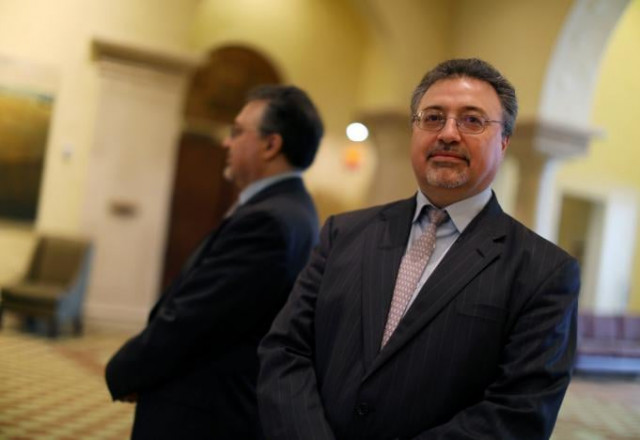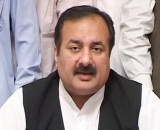In the Trump era, one US Muslim investor tries a louder voice
Qasem expressed optimism about US economic growth, given Trump's agenda of tax cuts & infrastructure investments

Activist investor Bashar Qasem, President and CEO of Azzad Asset Management Inc, is pictured at a conference in Huntington Beach, California, U.S. February 18, 2017. PHOTO: REUTERS
Working from an office in Falls Church, Virginia, Bashar Qasem was the only Islamic financial representative among religious shareholder advocates who sent a letter in February to protest US President Donald Trump's travel ban.
It was only one of a number of such moves since 2015, when Qasem's Azzad Asset Management firm started weighing in on issues like worker safety, climate change and lobbying disclosures. This direct advocacy will test whether many US Muslim investors will support the sort of faith-based shareholder activism common among other religious groups even as many cite safety concerns or have experienced bullying.
Islamic finance body drafts new standard for centralised sharia boards
Qasem said his clients seemed to welcome his growing public role. Most are Muslim, and about half are immigrants. "Most of them, they feel it's about time," said Qasem, who grew up in Jordan, moved to the United States in 1987 and became a citizen in 1996.
So far Qasem's strategy appears to be helping to differentiate his firm at a time when the popularity of cheaper index-tracking products is rising.
Azzad's assets increased 11 per cent in 2016 to US$487 million at year-end. Growth included US$5.7 million into the firm's mutual funds, the third consecutive year of inflows.
By contrast, the Amana family of mutual funds, which Morningstar says is the largest in US Islamic finance at US$2.9 billion of assets, has had three years of investor withdrawals, which it blames partly on the rise of passively managed products.
Laila El-Haddad, who writes about food and Palestinian politics, said Qasem's outspokenness helped draw her to his firm. "Given the choices between two Islamic investment companies," she said, "we would definitely opt for the one taking this approach."
TESTING INVESTORS' FAITH
Funds involved in Islamic finance are sometimes classified as "Sharia-compliant," or adhering to religious precepts such as avoiding investments in alcoholic beverage companies and businesses making or receiving interest payments.
Qasem said he preferred the term "Halal investing," referring to the Arabic word for "permitted" investments.
Workshop: Islamic finance registers growth
Islamic finance assets stood at US$2 trillion worldwide in 2015, up from US$1.7 trillion in 2012, according to the latest Thomson Reuters data. The much smaller US$4.6 billion US Islamic finance sector, however, has grown little in recent years. Only a few institutions, mostly community banks, have significant Islamic lending practices.
Ibrahim Warde, an adjunct professor at Tufts University's Fletcher School, said the slow growth reflected both US regulations that make some Islamic products difficult to offer and some Muslim financial executives' desire to avoid drawing attention, given the public mood.
"There's this question of keeping a low profile," he said. Sheraz Iftikhar, managing partner of New York wealth manager Arch Global Advisors, said his clients, who are mainly Muslim, had not changed their investment strategies lately. "It's too early to see a change in Muslim investor sentiment," said Iftikhar.
Typical of Qasem's recent efforts is a measure that Azzad co-filed in January, calling on Google parent Alphabet Inc to adopt "Holy Land Principles" that would lead US companies doing business is Israel to hire more Palestinian Arabs.
On cpec and beyond: IBA’s Islamic finance centre holds forum
Azzad spokesperson Joshua Brockwell said Alphabet told the firm it would hold a vote on the measure at its annual meeting. Azzad has also co-filed a shareholder resolution calling on Exxon Mobil Corp to disclose more about its spending on lobbying. Brockwell said the oil company would probably oppose the measure, as it did last year.
Spokesperson for Alphabet and Exxon declined to comment.
In addition, Qasem signed on to a February 1 letter from the Interfaith Center on Corporate Responsibility and other groups, urging business leaders to use an upcoming meeting with Trump to speak out against his ban on travelers from a number of Muslim-majority nations.
Courts have since blocked the restrictions, and the US Justice Department has appealed the rulings.
While the ban jarred Qasem and some of his clients, he expressed optimism about US economic growth prospects, given Trump's agenda of tax cuts and infrastructure investments. Higher interest rates could also help Azzad's holdings in low-debt companies, he said.
"After all," Qasem said of Trump, "he's a businessman."



















COMMENTS
Comments are moderated and generally will be posted if they are on-topic and not abusive.
For more information, please see our Comments FAQ